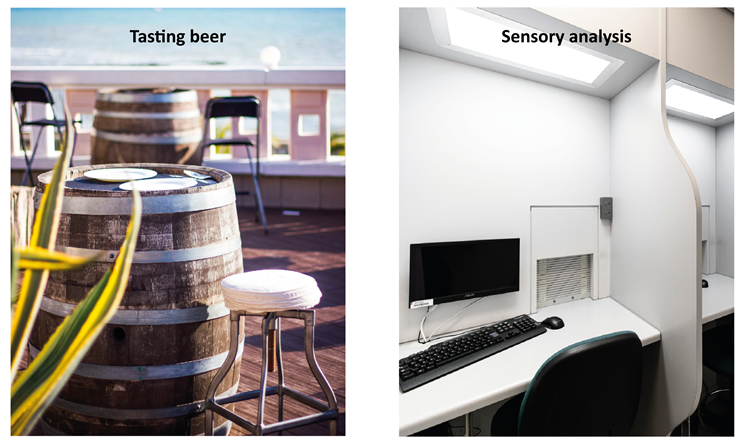Flavour is beer’s most important attribute and yet no machine can measure it. Fortunately, if we follow the right steps, brewers can evaluate beer flavour effectively using sensory analysis.
So what is sensory analysis?
It would be wonderful if sensory analysis involved a relaxed, convivial atmosphere and an animated discussion of the elements of the beer’s flavour and the brewer’s motivation for its design. The setting is a sunlit terrace overlooking the ocean, with a selection of vegan charcuterie and bar snacks provided. As more beer flows, true enlightenment is gained about how the layers of flavour juxtapose and align to create the overall sensory experience. Then there is the simple task of recording the group’s consensus and congratulating or commiserating the brewer. Of course, this isn’t the case and without an understanding and control of the analysis process, any effort expended on sensory may be counterproductive.
Sensory analysis is the systematic evaluation of beer flavour.

It is possible to do a lot of things right in sensory analysis and still get inaccurate results. For example, you can spend hundreds on getting all your staff familiar with common off flavours and then conclude the off flavours are present when they are not, because of errors in sample presentation or results handling. You can design great sensory tests with perfect tasting forms and then have incapable assessors give you misleading results. You can also spend a lot on software that tells you what that software is designed to tell you, but not what you actually need to know! The new on-demand Beer Sensory Analysis course will help ensure that you don’t have these problems.
Taste is unique amongst the senses in that one stimulus can be perceived in many different ways by different people. What you see, hear and feel is pretty much the same as what everyone else sees, hears and feels. For example, to me, a rose looks like a rose, and unless you are hallucinating it looks like a rose to you. Even if you are visually impaired, it may look like a blurry rose, but still like a rose. However, the flavour of even a single chemical compound is described in several different ways by different people and even by the same person depending on the context. A compound that smells of butterscotch to me, may smell like caramel to you or maybe of nothing at all. For this reason, when designing and undertaking sensory evaluation, we must ensure these differences are eliminated or at least taken account of.
Sensory analysis is one of the aspects of brewing that many may think is not part of a brewer’s role, but something the lab does for us. Even if this is the case for you, you need a practical understanding of the process to be confident that what the lab is telling you is what you need to know.
In days gone by, information for brewers on all aspects of brewing was scarce. We were faced with leafing through longwinded textbooks for pearls of wisdom that might provide the answer we were looking for, or just relying on our detective skills and judgement. Today there are hundreds of books, online articles, YouTube videos and free webinars that we can use to access information. Unfortunately, at the end of most of them, you end up thinking, that was interesting, but about as useful as an ashtray on a motorbike. Sometimes you even forget why you started watching them in the first place, or thinking that’s an hour of my life I won’t get back! IBD short courses are designed by brewers, for brewers to give you the knowledge and tools you need to get the most out of your time and effort in the brewery.
What is the sensory analysis course?
The IBD Beer Sensory Analysis course gives you the skills, knowledge and tools required to implement an effective sensory analysis system in your brewery. It provides an in-depth explanation of beer flavour and the details of over 100 important beer flavour compounds. It covers all the sensory tests used in breweries, with videos taking you through the process used and how to evaluate the results.
Although designed principally for experienced commercial brewers with a sound understanding of the basics of brewing, the Beer Sensory Analysis course may also benefit more serious home brewers. While it assumes some level of brewing knowledge and understanding of science and maths, it should be accessible to most people with an interest in brewing. Whatever the size of your brewery, this course should help you better understand beer flavour and to get the best value from your sensory endeavours. It may also save you spending money on the services of companies providing sensory management systems and training when you don’t actually need to!
The sensory analysis course was developed with the assistance of leading beer sensory professionals. It features text, videos, and animations, along with quizzes and games that give you the opportunity to check your understanding of each section and extend your learning. At the end of the course, you will receive the certificate of completion. There is also a downloadable pdf with:
- Technical information
- Flavour thresholds of over 100 key beer flavour compounds
- Flavour standard specifications
- Tasting forms
- Statistical tables
- Equations and calculations
No matter what size your brewery is, if you have the skills and knowledge required to understand and undertake effective sensory analysis, you can access the information you need to shape and control the flavour of your beer. Then you can retire to the sunlit terrace overlooking the ocean and enjoy a beer in celebration of your brewery’s success!
Stuart Howe




